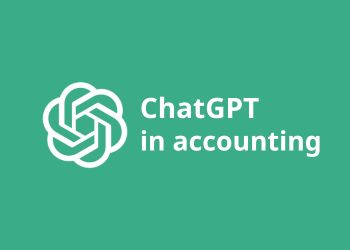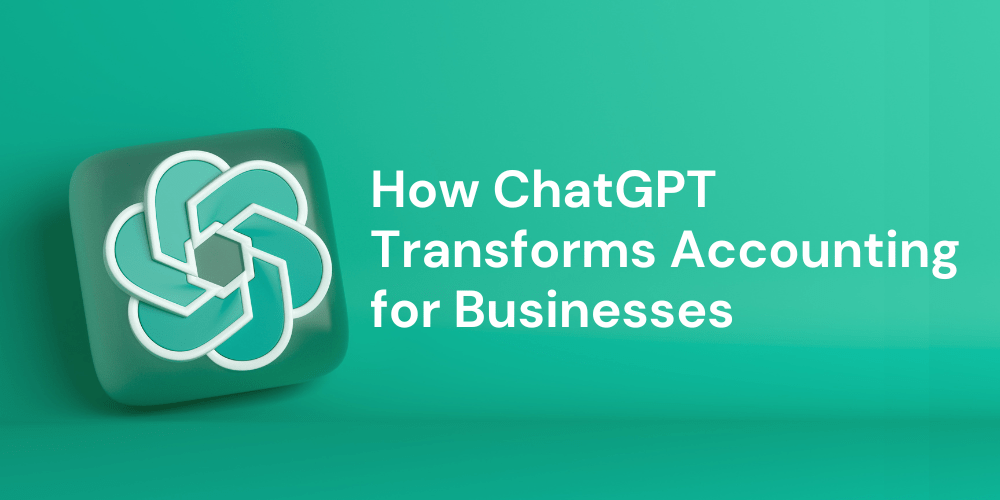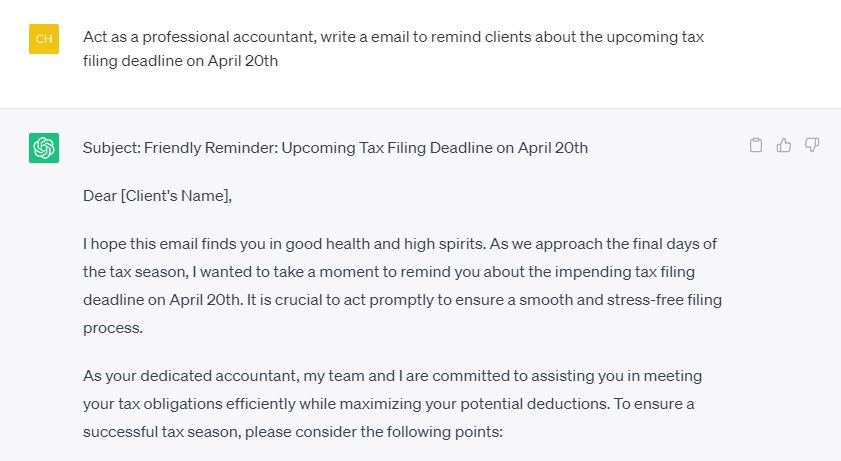ChatGPT in Accounting: How ChatGPT Transforms Accounting for Businesses

AI has proven to be highly valuable in various industries, despite concerns about job displacement. With appropriate prompts, AI can produce human-like speech, predict maintenance needs for engineering systems, and handle various tasks effectively. This explains why most people get caught between panic and fascination. However, AI, including ChatGPT in accounting, serves as a force multiplier in this field. It’s essential to understand how these technologies function to stay competitive within the industry.
Looking back, accountants and bookkeepers used to manually record financial transactions, which was a laborious process involving stacks of paper-filled binders. The introduction of computers streamlined the process, enabling the management of general ledgers with software, making accounting teams faster and freeing up their brain power for more intricate tasks.
If you choose not to embrace AI in accounting to boost your firm’s productivity, you may find it challenging to keep pace with the evolving industry.
Rather than viewing AI as a threat, seize the opportunity to learn and leverage relevant AI tools, especially ChatGPT, to foster growth and scalability within your firm. Embracing these technologies can lead to enhanced efficiency and improved outcomes.
Read more: Latest Accounting Trends in 2023 | Future in Accounting
What is ChatGPT?
ChatGPT is an AI language model developed by OpenAI. It is based on the GPT (Generative Pre-trained Transformer) architecture, specifically GPT-3.5. ChatGPT is a state-of-the-art natural language processing (NLP) model that has been trained on a massive amount of text data to understand and generate human-like text.
The “GPT” in its name stands for “Generative Pre-trained Transformer,” indicating that it is a generative model capable of producing text and has been pre-trained on vast amounts of data before fine-tuning for specific tasks.
ChatGPT’s training process involves pre-training on a large corpus of internet text, where it learns the patterns and structures of language, including grammar, syntax, and context. This pre-training enables the model to have a broad understanding of human language and knowledge across various domains.
Once pre-training is completed, ChatGPT undergoes a fine-tuning process where it is trained on specific datasets for particular applications, making it more specialized for specific tasks, such as language translation, text completion, question-answering, and more.
The power of ChatGPT lies in its ability to understand natural language input and generate human-like responses, making it suitable for a wide range of applications, including virtual assistants, customer support, content generation, educational tools, and much more. ChatGPT-4 is known for its ability to engage in human-like conversation, making it a powerful tool in numerous applications, including accounting. OpenAI provides API access to ChatGPT, allowing developers and businesses to integrate this language model into their applications and leverage its language understanding capabilities.
Why Should Businesses Leverage ChatGPT In Accounting?
Businesses can benefit from leveraging ChatGPT in accounting for several compelling reasons:
- Automation and Efficiency: ChatGPT can automate routine accounting tasks such as data entry, categorization, and basic bookkeeping. By reducing manual labor, it increases efficiency and allows accounting teams to focus on more strategic and value-added activities.
- Time Savings: By offloading repetitive tasks to ChatGPT, accounting professionals can save significant time and allocate their efforts to more complex financial analyses and decision-making.
- Error Reduction: AI-powered tools like ChatGPT are less prone to human errors, providing greater accuracy in data processing and financial reporting.
- 24/7 Support: ChatGPT can serve as a virtual assistant, available round-the-clock to handle client inquiries, answer questions, and provide support even outside regular business hours.
- Scalability: As businesses grow, the workload in accounting also increases. ChatGPT can easily scale to handle higher volumes of data and tasks, ensuring consistent and efficient accounting processes.
- Real-time Insights: ChatGPT can analyze financial data and provide real-time insights, enabling businesses to make more informed decisions promptly.
- Cost-Effectiveness: Compared to hiring additional human resources to handle increasing accounting demands, leveraging ChatGPT can be a cost-effective solution.
- Regulatory Compliance: ChatGPT can stay updated with the latest tax regulations and accounting standards, reducing the risk of non-compliance.
- Improved Customer Experience: With ChatGPT’s natural language processing capabilities, businesses can offer more personalized and responsive customer support, enhancing the overall experience for clients.
- Enhanced Forecasting and Planning: ChatGPT can assist in financial forecasting, helping businesses make informed projections and plan for the future.
- Training and Onboarding: ChatGPT can be used for training new accounting staff, providing them with interactive learning experiences and guidance.
By leveraging ChatGPT in accounting, businesses can streamline processes, improve accuracy, and elevate the overall efficiency of their financial operations. However, it’s essential to strike the right balance between AI-driven automation and human oversight to ensure the best outcomes. Additionally, while ChatGPT offers remarkable benefits, it should not replace the expertise and judgment of skilled accounting professionals but rather complement their capabilities to drive better results.
8 Ways Businesses Can Use ChatGPT In Accounting
1. Invoices and Expenses Categorization
Handling a multitude of invoices and expenses on a daily basis can be a laborious task for businesses. Manual categorization is not only time-consuming but also vulnerable to mistakes. Enter ChatGPT, equipped with its extensive training on diverse internet text. This AI-powered solution enables businesses to automate the categorization process efficiently. Leveraging its machine learning capabilities, ChatGPT in accounting can analyze and classify invoices and expenses into predefined categories or even adapt and enhance its categorization accuracy over time, leading to improved efficiency and reduced errors.
However, you should review and tailor the template to align with your specific needs and ensure compliance with relevant tax laws and regulations.
2. Revolutionizing Financial Projection
Accurate financial projections play a vital role in strategic planning, fundraising, and assessing a business’s financial well-being. Traditionally, generating these projections involved laborious manual data entry, sorting, and complex calculations, which left room for errors and consumed significant time. Fortunately, the introduction of AI and machine learning, exemplified by ChatGPT, has transformed this process by streamlining and enhancing accuracy.
3. Simplifying Financial Report Generation
Creating financial reports is a crucial accounting task that often demands considerable time and effort. However, ChatGPT can revolutionize this process by automating the generation of essential financial reports, such as income statements, balance sheets, and cash flow statements, based on the provided data. This automation allows accountants to devote more time to analyzing reports and providing valuable strategic insights to the business.
Feel free to utilize the ChatGPT File Uploader Extended to submit any additional supporting documents or receipts for the expense, ensuring comprehensive review by ChatGPT.
However, please also be careful and ensure that you don’t upload any sensitive or confidential information to avoid potential security issues.
4. Audit Document Processes
Auditing requires thorough examination of extensive financial data, often leading to time-consuming and labor-intensive efforts. ChatGPT comes to the rescue by efficiently scanning and organizing data, simplifying the audit process. It can cross-check entries, detect anomalies, and facilitate documentation management, thereby reducing manual data handling burdens.
5. Client Support & Communication
As a trusted accountant, keeping clients well-informed about regulatory changes, impending deadlines, and financial matters is paramount. With ChatGPT’s assistance, effortlessly generate clear and concise emails, letters, or other communication materials to ensure clients stay updated and informed.
6. Financial Data Analysis and Forecasting
Strategic planning heavily relies on analyzing financial data and predicting future trends. ChatGPT’s proficiency in processing vast data volumes and identifying patterns equips businesses with valuable insights into their financial health and future projections. This informed decision-making aids in risk management and capitalizing on opportunities.
7. Ensuring Tax Compliance
Navigating complex and evolving tax laws is a challenge for businesses. ChatGPT in accounting proves invaluable in staying up-to-date with these changes and ensuring tax compliance. It assists with tax liability calculations, filing returns, and offering basic tax guidance. However, for intricate tax matters, it’s crucial to seek professional advice.
8. Fraud Detection
Mitigating financial fraud is of utmost importance to businesses. By analyzing financial data and recognizing unusual patterns, ChatGPT enhances fraud detection efforts. It can identify irregular transactions, inconsistencies in financial reports, and suspicious invoices and expenses, contributing to a robust fraud prevention strategy.
Limitations of ChatGPT in Accounting Work
While ChatGPT in accounting offers numerous advantages and time-saving capabilities for various tasks, there are specific drawbacks that make it less helpful for accountants seeking to leverage this technology.
- Inaccurate responses: Despite its impressive capabilities, ChatGPT sometimes generates responses that appear accurate but are actually based on incorrect information. Users may receive suspicious answers, and fact-checking often reveals the inaccuracies. In some cases, when corrected, the chatbot may even respond humorously.
- Obsolete information: ChatGPT was developed and launched in 2021, utilizing data available at that time for training. However, the accounting field is constantly evolving, and new information and regulations have emerged since then. The software lacks the intelligence to keep itself updated with the latest developments, making it unwise to solely rely on ChatGPT for accounting information due to the risk of receiving outdated information.
- Incorrect context: Certain words or phrases can have different meanings depending on the context. While humans naturally excel at interpreting context, AI chatbots like ChatGPT may struggle with this aspect, leading to inaccurate responses that do not align with the intended meaning.
- Misinterpretation of the law: Accountants’ expertise in understanding accounting laws and ethics comes from years of training and experience. In contrast, ChatGPT was trained using a vast array of sources from the internet, including encyclopedias and books. Consequently, the software might incorporate regulations that do not apply to a specific region, leading to significant misinterpretation of the law in certain cases.
Will AI Replace Accountants?
While AI has the potential to automate many routine tasks in accounting, it is not expected to completely replace accountants due to several key reasons:
- Complex Decision Making: Accountants go beyond data processing; they make intricate decisions, provide strategic advice, and apply professional judgment. These tasks require human expertise and intuition, which current AI technology cannot effectively replicate. For instance, while AI can flag unusual transactions, it still requires an accountant to investigate and understand the context behind these anomalies.
- Human Interaction: A significant aspect of an accountant’s role involves interpersonal skills, such as communicating financial matters with clients, resolving conflicts, and presenting financial information to non-financial stakeholders. AI lacks human emotional intelligence and a nuanced understanding of human communication, making it unable to fully replace these interactions.
- Ethics and Professionalism: Accountants adhere to ethical standards and professional guidelines while handling sensitive data. They must maintain confidentiality and integrity, responsibilities that AI, despite being rule-based, does not comprehend due to its lack of ethics and professionalism.
- Regulations and Standards: Navigating the complexities of financial regulations and accounting standards often demands interpretation and exercise of judgment. Accountants undergo training and possess the knowledge necessary to navigate these intricacies, while AI may encounter challenges in handling such nuanced tasks.
- Adaptation to Change: The financial landscape is ever-evolving, with the continual emergence of new regulations, business models, and financial instruments. This dynamic environment requires adaptability, a trait in which human accountants excel, while AI might face difficulties in keeping pace with rapid changes.
However, it’s important to note that AI can significantly transform the role of accountants. By automating many routine tasks, AI frees up accountants to focus more on strategic, advisory, and decision-making roles. In this context, AI serves as a powerful tool that complements human accountants, enhancing their capabilities rather than replacing them entirely. The future of accounting is likely to involve a collaborative relationship between accountants and AI, where each contributes its unique strengths to achieve optimal results.
What Does the Future of ChatGPT in Accounting?
Despite the evident limitations, it’s essential to recognize the valuable qualities of ChatGPT in accounting that can enhance your work experience. However, it is unrealistic to assume that the software will entirely replace accountants in the future, alleviating concerns about job loss to automation.
Accounting inherently requires the human touch for tasks like interpreting context, applying ethical judgment, and fact-checking. Additionally, communication skills and client interactions are crucial aspects of accounting that AI software cannot effectively replace.
Conclusion
AI tools have left a significant impact on various industries, and businesses are actively integrating technology to remain competitive and improve efficiency.
Our recommendation is not to solely rely on ChatGPT for all your accounting work, but instead, leverage your expertise and judgment to identify areas where this AI tool can facilitate your tasks, minimizing errors and streamlining processes effectively. By combining your human intelligence with AI capabilities, you can enhance your accounting practices and ensure continued success in the evolving technological landscape.




